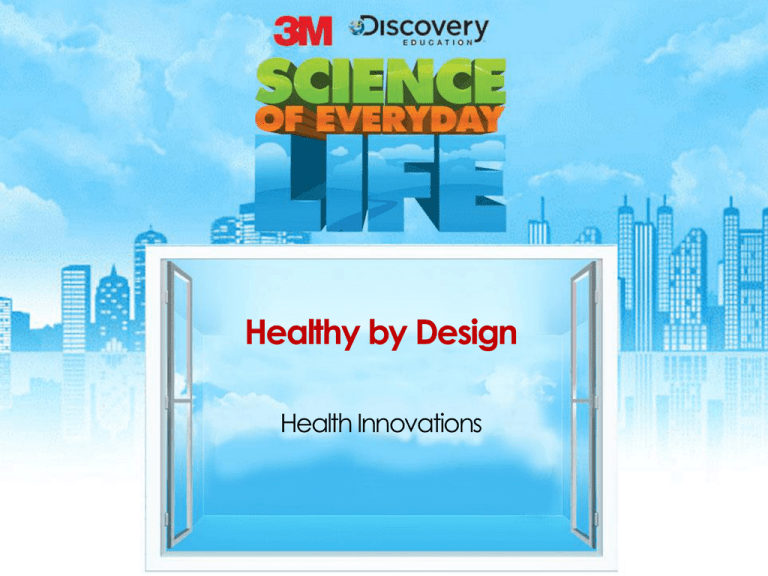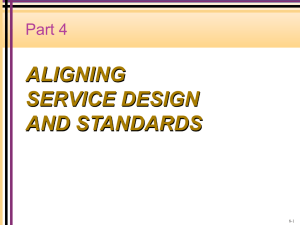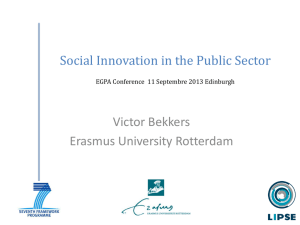Interactive Lesson - 3M Science of Everyday Life
advertisement

Healthy by Design Health Innovations 1 Engage Health Innovations Hand Sanitizer Electric Toothbrush Motorized Wheelchair MRI Machine Health Innovations Discussion Questions What is the name of the innovation assigned to you? What is it used for? How does it work? Describe the science and engineering behind it. How does the innovation help people? What did people use before this object was invented? How might your life (or the lives of others) be different if this object had not been invented? Everyday Health Innovations This device allows a medical professional to listen to the internal sounds of a human or animal. It is most familiarly used to listen to heart and lung sounds. There are several different types in use. The use of this device is called “auscultation.” [Image of stethoscope] Everyday Health Innovations A pedometer is a device that measures the number of steps a person takes. Pedometers can help people measure and increase their daily activity level. Digital pedometers include a sensor and software. Many everyday electronics, such as cell phones, come with this device included. [Image of digital pedometer here] Everyday Health Innovations The scientific name for this device is “prosthesis.” Prosthetic devices can be used to replace body parts both external and internal. The ancient Egyptians were early pioneers in the use of prosthetic devices. Modern materials have revolutionized the creation of prosthetic devices. [Image of artificial limb] Everyday Health Innovations An insulin pump frees a person with diabetes from having to administer several insulin injections daily. The pump delivers insulin directly into the wearer’s body. Many of these devices can be “synched” with a personal computer in order to track dosage and history. Everyday Health Innovations The use of lasers to correct vision problems was first explored in the early 1980s. Laser surgery does not result in heat damage to nearby tissues. The procedure is very safe. However, some patients find that their results aren’t permanent. Everyday Health Innovations Weighing scales can be used to monitor your body weight. A scale like this one works through the use of levers and springs. Digital scales are widely available and inexpensive. There are many types of scales— you’ll find them at the grocery store, the pharmacy, and the chemistry lab, among other places. [Image of digital scale] Everyday Health Innovations Orthodontists use wires and brackets to create braces, which can straighten teeth. Braces use pressure to loosen and move teeth into the proper alignment. Patients usually wear braces for a year or more to reach the desired results. Plastic (“invisible”) braces are now available. [Image of orthodontic braces] Everyday Health Innovations A blood pressure cuff measures a person’s blood pressure—the pressure exerted by circulating blood on the walls of blood vessels. Regular measuring of blood pressure is a good way to monitor for hypertension—high blood pressure. Hypertension strains the heart and can contribute to many diseases. [Image of digital blood pressure cuff] Everyday Health Innovations Along with stitches and staples, glue is often used to close wounds. The use of medical glue is especially helpful in treating small children, who may be frightened by stitches or staples. If you have a wound, do not try to glue it closed. Seek medical attention. Everyday Health Innovations A thermometer measures temperature or the difference between two temperatures. Digital thermometers contain a temperature-sensitive electric resistor. An inexpensive computer inside the digital thermometer interprets the resistor’s response into a numerical reading. Health Innovations Discussion Questions What is the name of the innovation assigned to you? What is it used for? How does it work? Describe the science and engineering behind it. How does the innovation help people? What did people use before this object was invented? How might your life (or the lives of others) be different if this object had not been invented? Game Rules Name all the health innovations you use in an average day. Work together with your group. Have one person record all your answers. In two minutes, name all the health innovations you use in an average day. Share your list with the class. Game Results Group 1 _________ Group 5 _________ Group 8 _________ Group 2 _________ Group 6 _________ Group 9_________ Group 3 _________ Group 7_________ Group 10 ________ Group 4 _________ 2 Explore Timed Discussion In your small group, discuss this question about diet and how it relates to your overall health. How important is it to you and your friends to eat healthy foods every day? [Insert photo of students eating lunch together] Timed Discussion In your small group, discuss this question about diet and how it relates to your overall health. Do you make it a point to eat healthy choices from all the food groups each day? [insert photo of healthy foods] Timed Discussion In your small group, discuss this question about physical activity and how it relates to your overall health. Are you physically active for at least 30 minutes on most days? [insert photo of students being physically active] Timed Discussion In your small group, discuss this question about diet and how it relates to your overall health. How many nights a week do you sit down with your family for a healthy meal? [insert photo of student eating with his or her family] Concluding Discussion Discuss these questions with the entire class. What are some ways you could add more physical activity into your day? What foods or food groups do teens not get enough of? What foods or food groups do teens get too much of? What’s more important: “perfect” healthy food choices for just one day or mostly healthy choices on most days? MyPlate Website Click the link to access the information on the MyPlate website. www.choosemyplate.gov Using MyPlate Click the link to learn more about using MyPlate. Launch Student Module 3 Explain Track Your Food Here are the guidelines for tracking your food intake. Write down everything you eat and drink. Estimate amounts (cups, ounces, etc) for each item you eat or drink. Ask an adult to help you if you need guidance in estimating amounts. Include snacks. Include any beverages you consume outside of meal times. Class Totals How did your class do? Circle graph with percentages 4 Extend Make Your Own Innovation Remember that innovation is “the act of introducing something new.” Create an innovation to help students lead healthier lives according to the MyPlate guidelines. Consider the needs of the innovation’s users. Describe the goal of your innovation. Explain how your innovation will work. Describe how your innovation will help people. Make a detailed sketch of your innovation. 5 Evaluate Presentation Guidelines Present your innovation to the class. Choose one person to be the main spokesperson. Describe the innovation, who it will help, and how it works. Present your visual representation of the innovation. Present your advertisement for the innovation. Answer any questions from your teacher and classmates. Assignment Rubric Use this rubric to evaluate group presentations. Presentation Element Description of innovation, who it will help, and how it works Maximum Points Possible 25 Visual representation of the innovation 30 Advertisement 35 Answers to student/teacher questions 10









